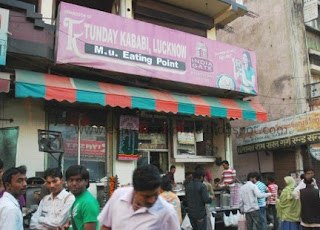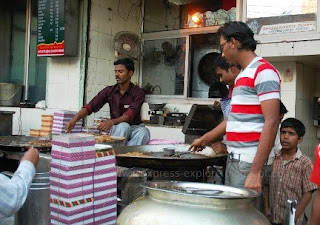Am back here after a long time. And of all the things in life, it had to be a Hollywood movie that made me come back. Alas.... Yes, its Avatar.
Supposedly, the most expensive movie of all time. Surely one of the most disappointing of all time, according to me. Firstly, what is all this about 'most expensive'? Is that supposed to make it attractive? Hardly. Its like that meaningless statistics that every subsequent Olympic/Asian/Commonwealth/ etc Games boast of. The BIGGEST games in history. Come on, pleeeeeeeez.
Anyway, back to the movie. It is a collection of all the things that America is adept at saying, but unfortunately never gets around to actually doing. So. What are they saying to the world (and to themselves, just in case you forgot)
1. We really should have treated the native Americans with a little more respect. But we killed most of them! Oops. Sorry, mate. But we couldn't help it, could we. They had bows and arrows, tomahawks, hatchets and what all! Can you imagine?? Savag.. Sorry. Wrong thing to say.
2. Vietnam was a big mistake. Kennedy died telling us so. But we weren't listening then. What could we have done? Let the Russians take over? NEVER. Here we come....
3. Kuwait, Iraq, Afghanistan, Cub..(sorry, not Cuba, really. That man Castro. How we wish we had him then!) and so many mistakes later. We don't learn really, do we? Sorry again, chum. Next time. Promise.
4. We should never underestimate the strength of an ex-marine. After all, HE is the one who went and fought for a cause that was thrust upon him, got bullets riddled into his body and came back a broken man. No, but we won't learn. There's always the bully colonel who will push his way through. Never mind the fact that he will get blown up too. Who cares?
5. We want the minerals, ok? Yes! Well, EVERYONE wants them, right? So we wanted oil and uranium and this and that. Its just that in this movie we are calling it by a silly scientific-sounding name - Unobtainium. And to get that, we will blast away anything (or anybody, for that matter) who gets in our way.
6. Don't mess with the savag... sorry, the natives. Even if you have the most ultra-modern weapons, they are useless against their primitive bow and arrows. Because, damn, they know the terrain better than we do!
7. Its no use employing stupid gum-chewing managers to lead such sensitive projects. They will bulldoze their way using technology, but will get beaten sooner or later. Don't get carried away by his conviction. See how in the movie we show him asking rudely, "Jake, what do those blue monkeys want"?
8.
9.
10.
11.
12.
I can list them endlessly, but will stop here.
Is it a 'bad' movie? Is it an entertainer? Ummm.... no and yes. Will kids love it? YES, SURELY.
But look at it closely, and it can just about compare with a B-grade Hindi thriller. Inane dialogues, sub-optimal use of technology and special effects (after spending all that money! That's the worst part!) and a very very predictable plot make it a dreary watch. And to top it all, it also matches very well with the Bollywoodean habit of stretching even the smallest story to almost THREE HOURS.
James Cameron gave us Titanic. Can't believe the same man could make such a disaster of a movie after that.
Last point. Even if one wants to admire the special effect, one can't. Star Wars (made decades ago) and Jurassic Park had a much better impact.
All in all, its an American-guilt-trip, and is a Sci-fi version of Pocahontas, with some bits of Lord of the Rings and Star Wars thrown in for special effects. The overall effect is really poor.
So much that at the last shot when Jake Sully's Avatar opens his eyes slowly, someone in the theater actually shouted, "Doctor saab. Mujhe kuchh dikhai nahi de raha. MUJHE KUCHH DIKHAI NAHI DETAAAAAAAA. Doctor SAAAAAB".
Psssst. That 'someone' was actually yours truly. My own way of getting back at the Americans. But are they listening? Nope.
Supposedly, the most expensive movie of all time. Surely one of the most disappointing of all time, according to me. Firstly, what is all this about 'most expensive'? Is that supposed to make it attractive? Hardly. Its like that meaningless statistics that every subsequent Olympic/Asian/Commonwealth/ etc Games boast of. The BIGGEST games in history. Come on, pleeeeeeeez.
Anyway, back to the movie. It is a collection of all the things that America is adept at saying, but unfortunately never gets around to actually doing. So. What are they saying to the world (and to themselves, just in case you forgot)
1. We really should have treated the native Americans with a little more respect. But we killed most of them! Oops. Sorry, mate. But we couldn't help it, could we. They had bows and arrows, tomahawks, hatchets and what all! Can you imagine?? Savag.. Sorry. Wrong thing to say.
2. Vietnam was a big mistake. Kennedy died telling us so. But we weren't listening then. What could we have done? Let the Russians take over? NEVER. Here we come....
3. Kuwait, Iraq, Afghanistan, Cub..(sorry, not Cuba, really. That man Castro. How we wish we had him then!) and so many mistakes later. We don't learn really, do we? Sorry again, chum. Next time. Promise.
4. We should never underestimate the strength of an ex-marine. After all, HE is the one who went and fought for a cause that was thrust upon him, got bullets riddled into his body and came back a broken man. No, but we won't learn. There's always the bully colonel who will push his way through. Never mind the fact that he will get blown up too. Who cares?
5. We want the minerals, ok? Yes! Well, EVERYONE wants them, right? So we wanted oil and uranium and this and that. Its just that in this movie we are calling it by a silly scientific-sounding name - Unobtainium. And to get that, we will blast away anything (or anybody, for that matter) who gets in our way.
6. Don't mess with the savag... sorry, the natives. Even if you have the most ultra-modern weapons, they are useless against their primitive bow and arrows. Because, damn, they know the terrain better than we do!
7. Its no use employing stupid gum-chewing managers to lead such sensitive projects. They will bulldoze their way using technology, but will get beaten sooner or later. Don't get carried away by his conviction. See how in the movie we show him asking rudely, "Jake, what do those blue monkeys want"?
8.
9.
10.
11.
12.
I can list them endlessly, but will stop here.
Is it a 'bad' movie? Is it an entertainer? Ummm.... no and yes. Will kids love it? YES, SURELY.
But look at it closely, and it can just about compare with a B-grade Hindi thriller. Inane dialogues, sub-optimal use of technology and special effects (after spending all that money! That's the worst part!) and a very very predictable plot make it a dreary watch. And to top it all, it also matches very well with the Bollywoodean habit of stretching even the smallest story to almost THREE HOURS.
James Cameron gave us Titanic. Can't believe the same man could make such a disaster of a movie after that.
Last point. Even if one wants to admire the special effect, one can't. Star Wars (made decades ago) and Jurassic Park had a much better impact.
All in all, its an American-guilt-trip, and is a Sci-fi version of Pocahontas, with some bits of Lord of the Rings and Star Wars thrown in for special effects. The overall effect is really poor.
So much that at the last shot when Jake Sully's Avatar opens his eyes slowly, someone in the theater actually shouted, "Doctor saab. Mujhe kuchh dikhai nahi de raha. MUJHE KUCHH DIKHAI NAHI DETAAAAAAAA. Doctor SAAAAAB".
Psssst. That 'someone' was actually yours truly. My own way of getting back at the Americans. But are they listening? Nope.















